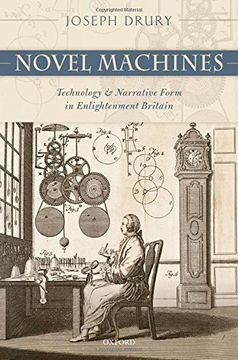Compartir
Novel Machines: Technology and Narrative Form in Enlightenment Britain (en Inglés)
Joseph Drury (Autor)
·
Oup Oxford
· Tapa Dura
Novel Machines: Technology and Narrative Form in Enlightenment Britain (en Inglés) - Joseph Drury
$ 157.390
$ 286.170
Ahorras: $ 128.780
Elige la lista en la que quieres agregar tu producto o crea una nueva lista
✓ Producto agregado correctamente a la lista de deseos.
Ir a Mis Listas
Origen: Estados Unidos
(Costos de importación incluídos en el precio)
Se enviará desde nuestra bodega entre el
Viernes 21 de Junio y el
Viernes 28 de Junio.
Lo recibirás en cualquier lugar de Chile entre 1 y 3 días hábiles luego del envío.
Reseña del libro "Novel Machines: Technology and Narrative Form in Enlightenment Britain (en Inglés)"
Eighteenth-century fiction is full of mechanical devices and contrivances: Robinson Crusoe uses his gun and compass to master his island and its inhabitants; Tristram Shandy's conception is interrupted by a question about a clock and he has his nose damaged at birth by a man-midwife's forceps; Ann Radcliffe's gothic heroines play musical instruments to soothe their troubled minds. In Novel Machines, however, Joseph Drury argues that the most important machine in any eighteenth-century novel is the narrative itself. Like other kinds of machine, a narrative is an artificial construction composed of different parts that combine to produce a sequence of causally linked actions. Like other machines, a narrative is designed to produce predictable effects and can therefore be put to certain uses. Such affinities had been apparent to critics since Aristotle, but they began to assume a particular urgency in the eighteenth century as authors sought to organize their narratives according to the new ideas about nature, art, and the human subject that emerged out of the Scientific Revolution. Reading works by Eliza Haywood, Henry Fielding, Laurence Sterne, and Ann Radcliffe, Novel Machines tracks the consequences of the effort to transform the novel into an Enlightenment machine. On the one hand, the rationalization of the novel's narrative machinery helped establish its legitimacy, such that by the end of the century it could be celebrated as a modern 'invention' that provided valuable philosophical knowledge about human nature. On the other hand, conceptualizing the novel as a machine opened up a new line of attack for the period's moralists, whose polemics against the novel were often framed in the same terms used to reflect on the uses and effects of machines in other contexts. Eighteenth-century novelists responded by adapting the novel's narrative machinery, devising in the process some of the period's most characteristic and influential formal innovations.
- 0% (0)
- 0% (0)
- 0% (0)
- 0% (0)
- 0% (0)
Todos los libros de nuestro catálogo son Originales.
El libro está escrito en Inglés.
La encuadernación de esta edición es Tapa Dura.
✓ Producto agregado correctamente al carro, Ir a Pagar.

